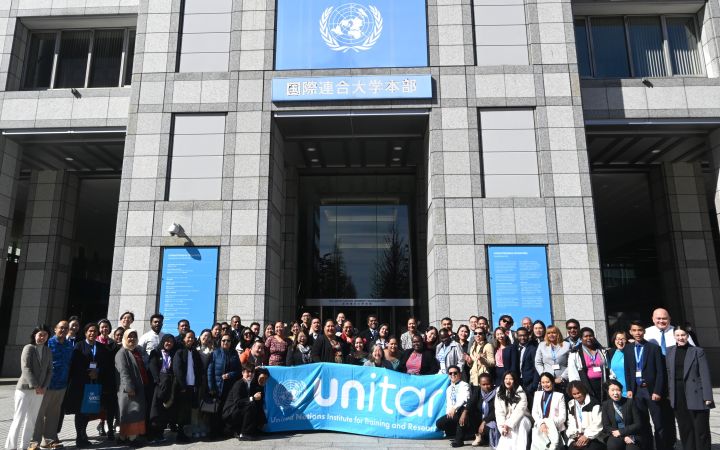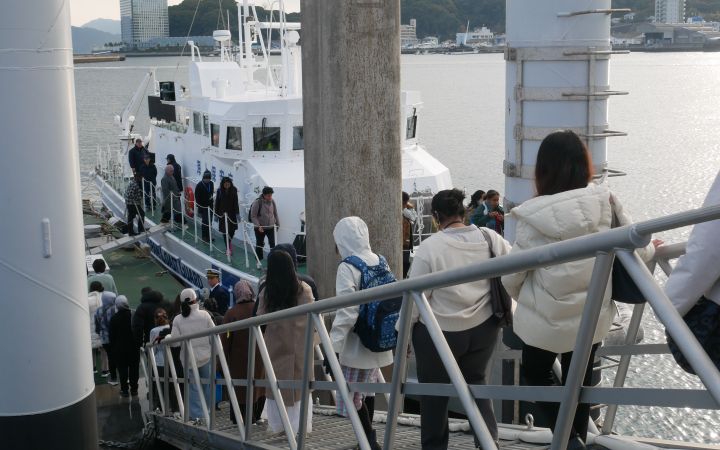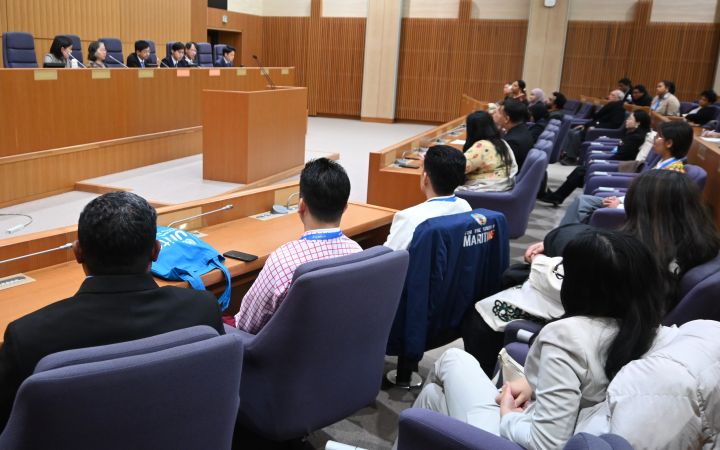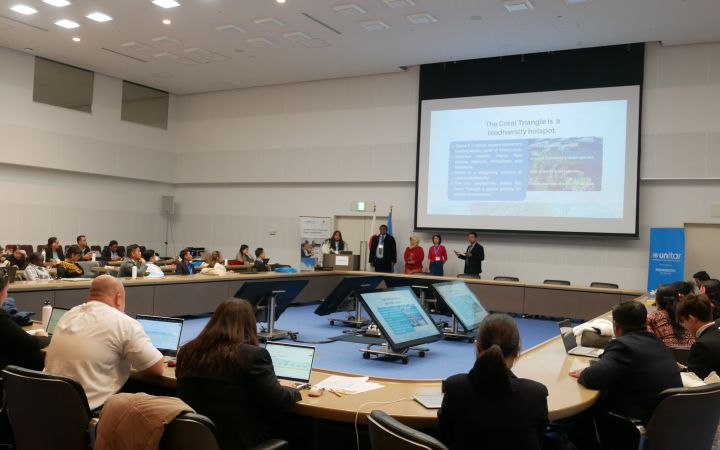- Fifty participants from 18 Asia-Pacific countries graduated from the UNITAR "Leaders for a Free and Open Indo-Pacific: Sea and Human Security" training programme on 21 February 2025. This marks the completion of the programme's third and final phase - a 12-day in-person workshop in Japan from 10 to 21 February.
- The workshop, financially supported by the Government and People of Japan, was designed to strengthen participants' capacities and foster a robust regional network to enhance local resilience against sea and human security challenges across the Indo-Pacific. The programme was generously supported by the Government and People of Japan.
- The participants visited Awaji Island, Hiroshima, Chiba, and Tokyo, engaging in interactive expert-led lectures, workshops and study tours and gained in-depth knowledge of marine resource management, sustainable fisheries and agriculture, ocean conservation, coastal resource management, wastewater treatment and disaster risk reduction.
- On the final day, participants presented their evidence-based policy briefs, which envision actionable solutions to pressing sea and human security issues in the Indo-Pacific. The workshop concluded with a certification ceremony and a public event to share the programme's outcomes.
21 February 2025, Tokyo, Japan - Fifty agents of change from 18 Asia-Pacific countries graduated from the UNITAR "Leaders for a Free and Open Indo-Pacific: Sea and Human Security" training programme on 21 February 2025. This marks the completion of the programme's third and final phase - a 12-day in-person workshop in Japan from 10 to 21 February. The workshop was designed to strengthen participants' capacities and foster a robust regional network to enhance local resilience against sea and human security challenges across the Indo-Pacific. The programme was generously supported by the Government and People of Japan.
Workshop Highlights
Over the 12 days, the participants visited Awaji Island, Hiroshima, Chiba, and Tokyo, engaging in interactive expert-led lectures, workshops and study tours. They gained in-depth knowledge of marine resource management, sustainable fisheries and agriculture, ocean conservation, coastal resource management, wastewater treatment and disaster risk reduction.
On the final day, participants presented their evidence-based policy briefs, which envision actionable solutions to pressing sea and human security issues in the Indo-Pacific. The workshop concluded with a certification ceremony and a public event to share the programme's outcomes. This event, " Ways Forward for Ocean Action in the Indo-Pacific ", featured keynote speeches, presentations of the policy briefs and panel discussions to foster public dialogue on ocean security.
Awaji Island Sessions (10-12 February)
On Awaji Island, participants joined interactive lectures and field activities designed by UNITAR in collaboration with Pasona Group Inc. , with topics including sustainable fisheries and agriculture, water security, microplastics, waste management, and ocean conservation. With the guidance of specialists, participants refined evidence-based group policy briefs that aim to address existing gaps in sea and human security in the region.
At WMI, despite being a startup, their focus extends beyond business; they are also committed to education, using biodegradable materials to teach the younger generation about sustainability.-Yuri Pratama Widiyana, UNITAR Training Participant(Indonesia)
Hiroshima Sessions (13-18 February)
The group travelled to Hiroshima, where they explored the city's legacy of peace at the Hiroshima Peace Memorial Park and participated in a wreath-laying ceremony at the Cenotaph for the Atomic Bomb Victims.
Participants also paid a courtesy visit to the Governor of Hiroshima Prefecture, Mr. Hidehiko Yuzaki, engaging in a productive dialogue about marine plastics, sustainable aquaculture, and sustainable tourism.
Lectures in Hiroshima focused on coastal resource management and conservation. Participants visited the Hiroshima City Fisheries Promotion Center and Inokuchi Fisheries Cooperative Association to learn about seaweed farming, the 6th Regional Coast Guard Headquarters and Hiroshima Port to observe Coast Guard operations, and the Hiroshima City West Water Recycling Center to understand wastewater management.
After attending sessions on coastal management and others, I realized there is a need to better connect land use planning with marine use planning. Instead of allowing water to flow into the ocean unused, it could be redirected to support agricultural irrigation. - Mary Enya Tegavota, participant, Solomon Islands
Sessions in Chiba and Tokyo (19-21 February)
The final leg of the journey began on 19 February in Chiba, where participants learned from lectures and study tours on environmental and disaster management, disaster risk reduction for coastal areas and coastal protection.
In Tokyo, they paid a courtesy visit to the Ministry of Foreign Affairs of Japan. Mr. MATSUMOTO Hisashi, Parliamentary Vice-Minister for Foreign Affairs welcomed the participants who shared their takeaways from the programme and how they would translate lessons learned to make a meaningful impact on their communities and countries. The study tour included a visit to Arakawa Lockgate and Kasai Rinkai Park where participants explored strategies for urban flood prevention, coastal protection infrastructure, and green-grey infrastructure complementation for sustainable coastlines.
Final Presentations and Public Event
On the final day, participants presented their policy briefs in groups, on topics such as the region's Deep Sea Mining, decarbonization in the maritime industry, Community-Based Marine Protected Areas etc., highlighting the importance to address key gaps in sea and human security.
The presentations were followed by a certification ceremony, where Chisa Mikami, Head of UNITAR Hiroshima Office, commended participants for their dedication and creativity to drive meaningful change in their communities.
The ideas [you] generated, the policies examined, and the connections formed have proved your commitment to excellence. You leave this workshop not just with new knowledge, but with the tools, networks and inspiration to make a difference in your respective fields. -Chisa Mikami, Head of UNITAR Hiroshima Office
The public event, "Ways Forward for Ocean Action in the Indo-Pacific", was held at the United Nations University in Tokyo. welcoming both in-person and online participation. The event hosted a dialogue on current trends and actionable solutions to enhance sea and human security in the Indo-Pacific.
Mr. ANDO Shigemi, Director, Global Issues Cooperation Division, Ministry of Foreign Affairs of Japan also delivered an opening remark, congratulating the participants on reaching the final day of the training and encouraging them to confidently present their proposed solutions to sea and human security challenges at this opportunity.
Notably, Former Prime Minister of Japan, KISHIDA Fumio, delivered a special video message for the participants in the training workshop, emphasizing the significance of this training programme which addresses critical issues facing today's world. Underscoring the Shimanami Collective programme's spirit to bridging diverse cultures, ideas, and people, he stated:
I hope that you will take the knowledge you have gained here back to your home countries and expand upon it while contributing to a sustainable future as a bridge between Japan and your respective nations. - Former Prime Minister of Japan, Fumio Kishida
As a keynote speaker, Mr. Keita Furukawa, President of the Association for Shore Environment Creation and Technical Session Chair at Partnerships in Environmental Management for the Seas of East Asia (PEMSEA), delivered a thought-provoking lecture emphasizing the need to integrate economic, social, and environmental dimensions of security and sustainability to effectively address sea and human security challenges in the Indo-Pacific.
In the policy brief presentations, selected participant groups shared their analyses of the gaps in sea and human security and proposed actionable solutions.
A panel discussion followed, featuring practitioners from Asia and Pacific Island countries. They exchanged views and insights on pressing sea and human security issues in the region, and discussed how we can take actions in making positive changes both within their respective communities and through strengthening collaboration.
About the Leaders for a Free and Open Indo-Pacific: Sea and Human Security Programme
" The Leaders for a Free and Open Indo-Pacific: Sea and Human Security " training programme aims to provide participants with the skills and knowledge to enhance climate, social, economic, food and maritime security and to establish a coordination mechanism across the Indo-Pacific. It is implemented by UNITAR and funded by the Government and People of Japan.










